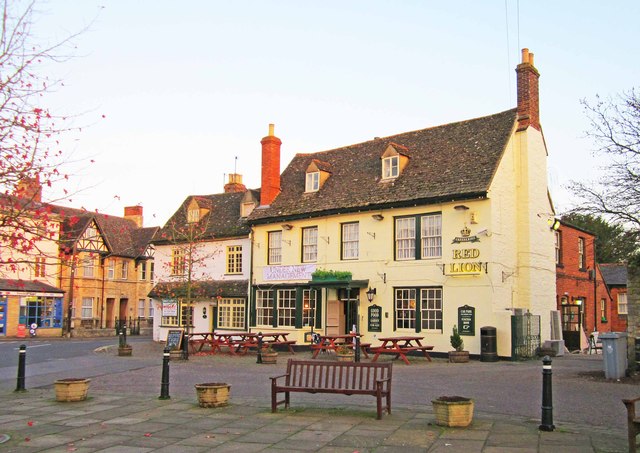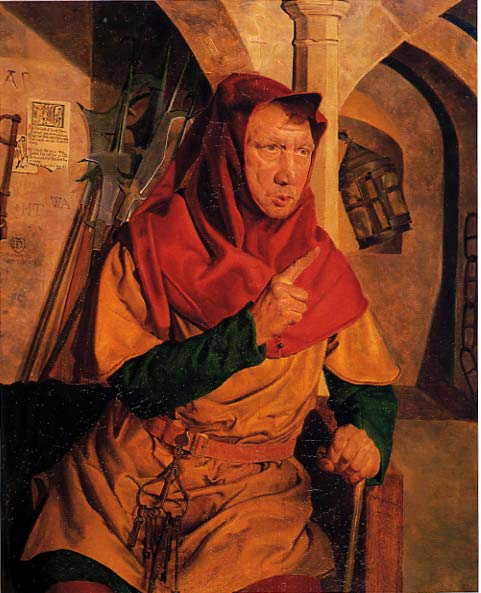On a cold winter day in January 1619, six men arrived at an inn, in Eynsham, Oxfordshire.
Amongst their number was Thomas Boyes, a carpenter and bailiff, Walter Whiting, a miller, and three other men, including John Wight, a sixty-year-old yeoman from Little Coxwell, Berkshire.
The sixth man, though, was different. He was their prisoner. His name was John Thompson, a Catholic gentleman from the tiny village of Broadwell, and he was under arrest.
Mr Thompson was being transported to Oxford Gaol, for offences unknown, and the men’s route had taken them through the Oxfordshire countryside for two days, twice stopping, twice the guards staying up to watch their prisoner to ensure he didn’t escape.
By the time they reached Eynsham, just five miles from the county town, the bailiff and his men were exhausted.
Whiting had been sent ahead.
Arriving in Eynsham, he made enquiries, and discovered that the best lodgings were to be had at the inn of one William Jourden. Approaching Jourden, he informed him that they were six, and one was a prisoner. They were given a room in the upper floors of the house, with three beds to share between them.
Things did not, however, go to plan.
The first suggestion that something was up was at supper, when Mr Thompson spoke ‘privately’ to Jourden the innkeeper. But the bailiff’s men let it pass, and eventually they retired upstairs, barring the door, with Whiting agreeing to sit up as guard while the other men, exhausted from their task, caught some sleep. Thompson sat in a chair, by the chimney, next to the wall.
Around 11pm, their slumber was disturbed by a loud knocking at the door.
It was Jourden, asking repeatedly to get in. According to Whiting’s testimony, he tried four or five times to get into the room, swearing ‘fearefull and vehement oathes that he would not be kept out of his owne house but that he would come into the same chamber’. This despite the fact that Whiting ‘did often tymes tell the said Jorden’ that they ‘had the chardge of a prisoner’.
Turning from vehement oaths to fair words, Jourden was eventually forced to give his warrant he would do no mischief, but he also said that an ‘honest gentleman’, one Mr Hampshire, would come to drink with the prisoner. Possibly against his better judgement, Whiting agreed, and the men were let in, but the door was barred again behind them.
What they talked about we don’t know, but shortly afterwards, the door rattled again. This time, it was a Mr Thomas Longe. As Jourden informed the increasingly suspicious Whiting, Longe was the minister of Eynsham parish church, just across the High Street from the inn.
Longe was a colourful character. As well as being minister of Eynsham, he was a fellow of Oxford’s All Souls College, and – as we know now – he would be one of the original purchasers of Shakespeare’s First Folio: his copy is now in the Folger Library in Washington DC. And, it seems, he was hard smoking, hard drinking, hard swearing, and he carried a rapier.

Once Longe was inside, Whiting again tried to bar the door, but the minister reacted angrily. Drawing his sword at Whiting, Longe threatened to run him through, not sparing his flesh, he said. In the din, the sleeping men began to rise from their beds.
As Thomas Boyes the bailiff rose, Mr Hampshire confronted him: what are you? He said, to which Boyes answered ‘he was the Kinges Majesties officer’.
‘You are a Bum-bailiff’, said Mr Hampshire, in ‘storm and wrath’. ‘I am the bailiff who arrested this prisoner’, retorted Boyes, at which Hampshire grabbed his hand, twisted it backwards and swore ‘terrible oathes’ at him: ‘by Gods bloode and woundes I will kill the base knave’. I’ll kill him, if he tries to disturb us, said Hampshire, my company ‘being gentlemen’.
Meanwhile John Weight also rose, to be confronted first by Mr Longe, and threatened with a rapier. At some point, Mr Hampshire also confronted the 60-year-old farmer Weight calling him ‘puritane villeyne’, and threatening to kill him.
This was around midnight, and by this point a group of local men had started pouring in, around six in total, armed with cudgels and truncheons, as well as Mr Longe’s rapier.
They fell to drinking and smoking. Taking tobacco and beer, say the witness statements. And making noise. According to the bailiff and his men, the company of gentlemen, led by Longe and Hampshire, for two or three hours broke forth into ‘loud singing, bouncing, leaping, dauncinge, hallowing, waslinge of a rapier [wassailing, i.e. toasting the sword] & other strange noyses and behaviours’.
The bailiff and his men were getting pretty nervous about all this, so they went to fetch the innkeeper, who also happened to be Eynsham’s constable. They found him dozing off by the fireside (understandably, perhaps, for by this time it was about three in the morning), but despite their entreaties, he wouldn’t budge, blithely telling them that they had his word their prisoner would be fine.
* * *
He wasn’t.
As the singing and the dancing and the banging on the tables and the (slightly odd) ‘bouncing’ continued, a group of men from the village brought a ladder to the inn, climbed up it, bashed through the wall, and pulled the prisoner out.
Suddenly the noise stopped, so the bailiff’s men ran back in. Asking where the prisoner was, Mr Hampshire sarcastically told them to look under the bed, but they could see the hole in the wall, and the bits of plaster on the ground outside. And they saw someone take down the ladder, and a group of men armed with staves outside. Mr Thompson was gone.
They couldn’t pursue him either, because someone had locked the door to the inn, and the keys had been hidden. They had lost their man.
The case ended up in Star Chamber, one of the royal courts. It traced the rescue to the house of Sir Edward Stanley, Earl of Derby, in Eynsham. Stanley was a Lancashire nobleman and a Catholic and he had, it seems, created a network of Catholic sympathisers in the town. The defence threw in some hearsay evidence that the bailiffs actually wanted rid of their prisoner, and had even asked for a bribe to let him free, but they didn’t have much.
In the end, they were reduced to claiming the hole in the wall was already there: one of their witnesses even testified that the hole had been there for sixty years!
* * *
It’s a nice story, of course, vividly told through the wonderful testimony of a Star Chamber suit. But that’s not the reason I’m interested.
I’m interested in what it tells us about the early Stuart state, and how it functioned. In particular, how it was performed. This incident was one of those moments where ‘the state’ had to act out its authority. It was a drama of state.
The state is, of course, many things. But one of these things is a performance. This is true even today: just look at the state’s use of uniforms. A uniform conveys authority. It is performative.
In 1619, most state actors didn’t wear uniforms, so they had to perform their role in different ways. States didn’t necessarily have large bureaucracies or standing armies, or police forces. Their technologies of surveillance and control were weaker. When someone was arrested at the far end of Oxfordshire, they had to be lodged in private accommodation as they made the long journey to the county gaol. Bailiffs and constables were private citizens who were asked to play a role as state actors. They were not professionals.
The bailiff and his men in this drama had to announce their role as state actors to gain authority, specifically linking their actions to the authority of the king: ‘I am the King’s Majesty’s Officer’. When they arrested someone that person became the ‘king’s prisoner’. These together created what we might call a magic of state, linking the actions of quite ordinary folk to the majesty of the king. There is a hint in this case that the state could take over space as well: Whiting uses the fact they are guarding prisoner to bar out Jourden from the chamber in the inn, though the latter argues that this is his private space, rather than the public one the officers have made it.

But the case also shows the real limits of this performative state power.
The Jacobean state’s monopoly of violence was by no means complete. In particular, it ran up against the competing claims of gentility. The bailiff and his men caved to professions of genteel honour; and the rescuers emphasized their gentility.
The wassailing of the rapier was perhaps especially symbolic: they are toasting a weapon that was simultaneously instrumental in their physical resistance to the state, but also represented elite honour against a group of plebeians who had dared to arrest and imprison a gentleman. We see the language of class a number of times through the suit.
And the state actors were mocked too: they were threatened, sworn at, subjected to sarcasm. They were not bailiffs but ‘bum-bailiffs’. In the courtrooms of the age, there were many cases of people prosecuted for not showing due deference to authority: refusing to doff their caps, scoffing and farting in the face of authority. The courts took these insults seriously because, when their own authority was but tentative, they were serious.
But most important of all, the case shows that the potential for small scale acts of resistance: in this case a rescue.
In a state with no standing army or police force, such petty resistance could be a significant check on authority.
Sure, this case ended up in a higher court, but how many people escaped arrest because the amateur local officers didn’t want to incur community wrath, and suffer the threat and humiliation of an incident like this?
Love it.